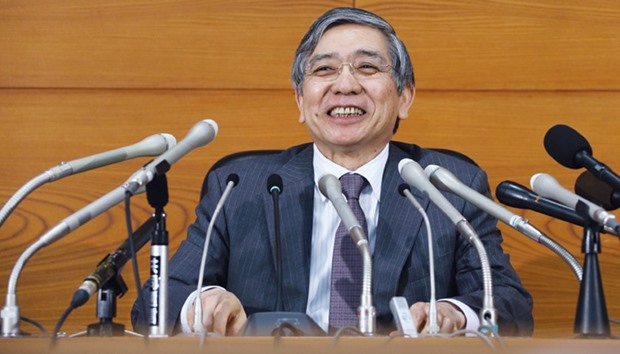Bank of Japan Governor Haruhiko Kuroda said he was “quite sure” the central bank could smoothly exit from its massive monetary stimulus when the appropriate time to do so came.
But he also said the BoJ “always” had room to expand monetary stimulus to achieve its 2% inflation target, indicating that wages and prices had been slow to respond to improvements in the economy.
The remarks suggest the BoJ is in no rush to swing monetary policy in either direction, particularly toward cutting back on stimulus with the economic recovery still fragile.
“There may be some challenging issues, but I’m quite sure the BoJ has enough tools” to manage an exit from its stimulus programme, Kuroda told a seminar hosted by the Wall Street Journal in Tokyo yesterday.
For whenever the BoJ decides to withdraw stimulus, Kuroda said there may be lessons to learn from how the US Federal Reserve normalises its ultra-loose monetary policy.
“But the United States is the United States, Japan is Japan.
At this stage, we’re not exiting,” Kuroda added, stressing that the BoJ was nowhere near an exit from its massive stimulus programme with inflation distant from its 2% target.
Under a new framework dubbed yield curve control (YCC) that was put in place last year, the BoJ caps long-term interest rates around 0% via aggressive asset purchases.
With inflation stubbornly stuck around 0%, BoJ officials have stressed that any exit from massive monetary support would be some time away.
But many market participants expect the BoJ’s next move to be a withdrawal, not an expansion, of stimulus as the economy shows signs of strength, thanks to a rebound in global demand. Some analysts worry about the sustainability of the BoJ’s stimulus programme, with the central bank having already gobbled up 40% of the Japanese government bond market.
Kuroda dismissed such concerns, saying the BoJ still has 60% of the market left to buy from.”I really don’t think there is any constraint to our yield curve control,” he said.
He also shrugged off concerns that expected interest rate hikes by the Fed could disrupt global markets and cool growth.
“I’m not very concerned about the normalisation process the Fed is implementing...as it reflects the strength of the US economy,” Kuroda said.
He added that the Fed’s policy would not have a direct impact on the BoJ’s monetary policy, which is focused on the domestic mandate of achieving 2% inflation.
“Our inflation rate is still quite low, so our monetary policy is targeted at achieving the 2% price target at the earliest possible time,” Kuroda said.

Kuroda: Confident on addressing challenging issues.
